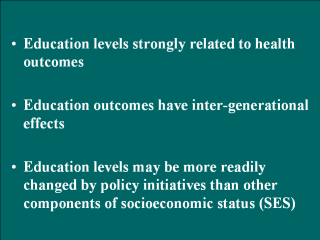| front |1 |2 |3 |4 |5 |6 |7 |8 |9 |10 |11 |12 |13 |14 |15 |16 |17 |18 |19 |20 |review |
 |
The relationship between education levels and health status is
well known. With each
increase of an
educational level in a population you have an increase in life
expectancy and health status.
It is also known that educational outcomes have intergenerational
effects. One of the strongest
predictors of child outcomes, whether the outcome is physical
health, mental health, behavioral problems or academic success, is
parental education levels, particularly maternal education levels.
It has long been recognized by researchers and some policy makers that health status is strongly correlated with income. However, it is very difficult to agree on a way of reducing the health disparities that are the result of income levels. Education on the other hand has the potential to be used as the great equalizer; since every child starts school we should theoretically be able to use the educational system to ensure that every child is given the opportunity to reach his or her potential.
It is for this reason that it makes sense to focus on
educational outcomes as a health policy issue.
|